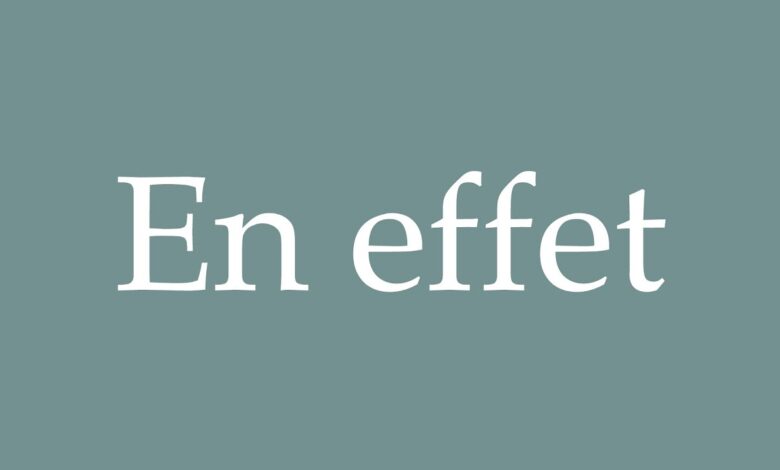En Effet: The Comprehensive Guide to Mastering This French Phrase

Introduction
The French language is rich with phrases that add depth and nuance to communication. One such phrase is “en effet,” which is commonly used in both spoken and written French. This blog post provides an in-depth exploration of “en effet,” examining its meaning, usage, and the contexts in which it is most appropriately applied.
What Does “En Effet” Mean?
“En effet” is a French phrase that translates to “indeed,” “in fact,” or “actually” in English. It is used to confirm or emphasize something that has already been stated. This section delves into the exact meaning of “en effet” and how it conveys affirmation or elaboration in conversation.
Historical Context of “En Effet”
The usage of “en effet” dates back centuries and has evolved over time. Understanding its historical context can provide insights into how its meaning and application have developed. This section explores the origins and historical evolution of “en effet.”
Common Usage of “En Effet”
“En effet” is often used to introduce explanations, confirm statements, or provide additional information. This section outlines the common contexts in which “en effet” is used, including examples from everyday conversation, academic writing, and media.
Using “En Effet” in Conversations
In casual and formal conversations, “en effet” can be a powerful tool to emphasize a point or provide clarity. This section provides practical examples of how to incorporate “en effet” into your spoken French, enhancing your fluency and comprehension.
“En Effet” in Written French
“En effet” is also prevalent in written French, particularly in essays, articles, and formal correspondence. This section discusses the importance of using “en effet” correctly in writing, with examples from literature and journalism.
Differences Between “En Effet” and Similar Phrases
While “en effet” is often translated as “indeed” or “in fact,” it is important to distinguish it from similar phrases such as “effectivement” and “de fait.” This section clarifies the differences and provides guidance on when to use each phrase.
Misconceptions About “En Effet”
There are common misconceptions about the use of “en effet,” particularly among non-native speakers. This section addresses these misconceptions, providing clear explanations and examples to correct them.
Examples of “En Effet” in Different Contexts
To fully grasp the versatility of “en effet,” it is helpful to see it in various contexts. This section provides diverse examples, including dialogues, formal speeches, and written excerpts, to illustrate its application.
Tips for Mastering “En Effet”
Mastering the use of “en effet” requires practice and attention to context. This section offers practical tips and exercises for incorporating “en effet” into your French vocabulary and improving your overall language skills.
The Role of “En Effet” in French Culture
Language reflects culture, and “en effet” is no exception. This section explores how the use of “en effet” fits into broader French cultural and communication patterns, enhancing your understanding of both the language and the culture.
“En Effet” in Professional Settings
In professional and academic settings, using “en effet” correctly can demonstrate a high level of proficiency in French. This section provides examples and advice for using “en effet” in professional contexts, such as presentations and reports.
Conclusion
“En effet” is a versatile and valuable phrase in the French language, enriching both spoken and written communication. By understanding its meaning, context, and correct usage, you can significantly enhance your French language skills and express yourself more clearly and effectively.
FAQs
1. What is the literal translation of “en effet”? The literal translation of “en effet” is “in effect,” but it is more commonly used to mean “indeed,” “in fact,” or “actually” in English.
2. Can “en effet” be used at the beginning of a sentence? Yes, “en effet” can be used at the beginning of a sentence to introduce an explanation or confirmation of a previous statement.
3. How does “en effet” differ from “effectivement”? While both can be translated as “indeed,” “effectivement” is more often used to confirm a statement, whereas “en effet” introduces an explanation or additional information.
4. Is “en effet” formal or informal? “En effet” is versatile and can be used in both formal and informal contexts, depending on the sentence structure and the overall tone of the conversation or text.
5. Can “en effet” be used in academic writing? Yes, “en effet” is commonly used in academic writing to introduce explanations, confirm previous statements, and provide additional information, adding clarity and depth to the text.




